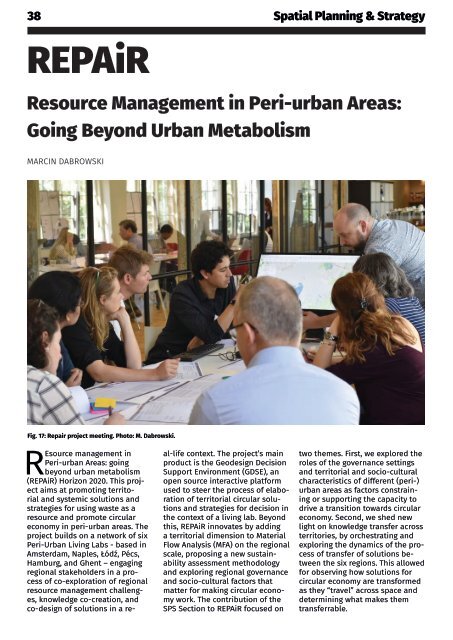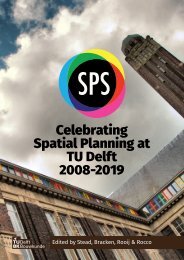*Celebrating Spatial Planning at TU Delft: 2008-2019. Edited by Stead, Bracken, Rooij & Rocco
This is a summary of the achievements of the session Spatial Planning & Strategy of the Department of Urbanism, Faculty of Architecture and the Built Environment, TU Delft, led by Professor Vincent Nadin between 2008 and 2019.
This is a summary of the achievements of the session Spatial Planning & Strategy of the Department of Urbanism, Faculty of Architecture and the Built Environment, TU Delft, led by Professor Vincent Nadin between 2008 and 2019.
You also want an ePaper? Increase the reach of your titles
YUMPU automatically turns print PDFs into web optimized ePapers that Google loves.
38 <strong>Sp<strong>at</strong>ial</strong> <strong>Planning</strong> & Str<strong>at</strong>egy<br />
REPAiR<br />
Resource Management in Peri-urban Areas:<br />
Going Beyond Urban Metabolism<br />
MARCIN DABROWSKI<br />
Fig. 17: Repair project meeting. Photo: M. Dabrowski.<br />
REsource management in<br />
Peri-urban Areas: going<br />
beyond urban metabolism<br />
(REPAiR) Horizon 2020. This project<br />
aims <strong>at</strong> promoting territorial<br />
and systemic solutions and<br />
str<strong>at</strong>egies for using waste as a<br />
resource and promote circular<br />
economy in peri-urban areas. The<br />
project builds on a network of six<br />
Peri-Urban Living Labs - based in<br />
Amsterdam, Naples, Łódź, Pécs,<br />
Hamburg, and Ghent – engaging<br />
regional stakeholders in a process<br />
of co-explor<strong>at</strong>ion of regional<br />
resource management challenges,<br />
knowledge co-cre<strong>at</strong>ion, and<br />
co-design of solutions in a re-<br />
al-life context. The project’s main<br />
product is the Geodesign Decision<br />
Support Environment (GDSE), an<br />
open source interactive pl<strong>at</strong>form<br />
used to steer the process of elabor<strong>at</strong>ion<br />
of territorial circular solutions<br />
and str<strong>at</strong>egies for decision in<br />
the context of a living lab. Beyond<br />
this, REPAiR innov<strong>at</strong>es <strong>by</strong> adding<br />
a territorial dimension to M<strong>at</strong>erial<br />
Flow Analysis (MFA) on the regional<br />
scale, proposing a new sustainability<br />
assessment methodology<br />
and exploring regional governance<br />
and socio-cultural factors th<strong>at</strong><br />
m<strong>at</strong>ter for making circular economy<br />
work. The contribution of the<br />
SPS Section to REPAiR focused on<br />
two themes. First, we explored the<br />
roles of the governance settings<br />
and territorial and socio-cultural<br />
characteristics of different (peri-)<br />
urban areas as factors constraining<br />
or supporting the capacity to<br />
drive a transition towards circular<br />
economy. Second, we shed new<br />
light on knowledge transfer across<br />
territories, <strong>by</strong> orchestr<strong>at</strong>ing and<br />
exploring the dynamics of the process<br />
of transfer of solutions between<br />
the six regions. This allowed<br />
for observing how solutions for<br />
circular economy are transformed<br />
as they “travel” across space and<br />
determining wh<strong>at</strong> makes them<br />
transferrable.




